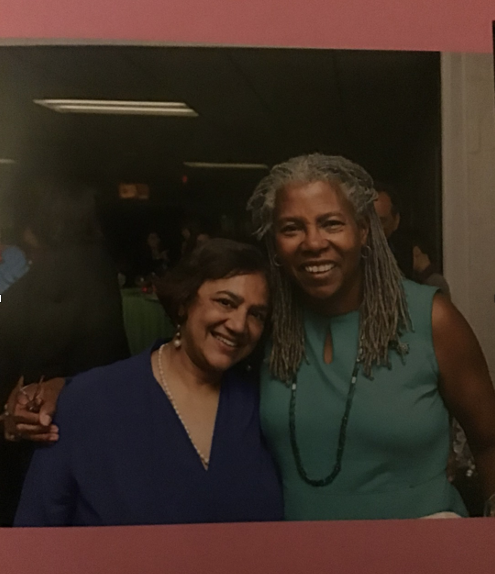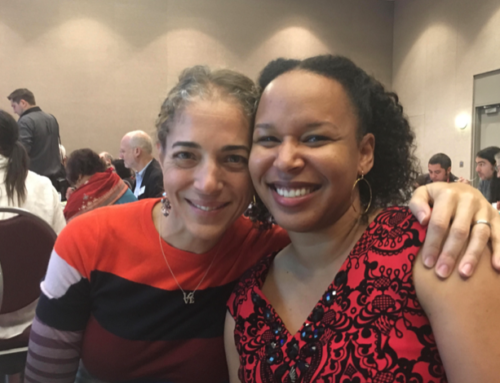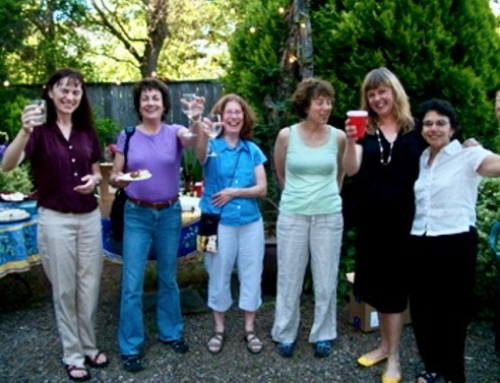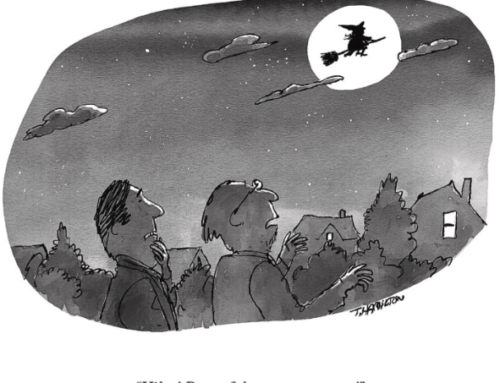I first met Augusta Lynn Bolles in 1980 when I was working on my doctoral dissertation research with a fellowship from the Inter-American Foundation. Lynn was also a Fellow and the Foundation had convened us all to discuss our research. We became friends at once, drawn together by a mutuality of interests. Subsequently, in 1989, Lynn left Bowdoin College to join the Women’s Studies faculty at the University of Maryland, where I also was on faculty in the Anthropology Department. By then, we were both mothers—she of two boys, me of a girl and a boy. The bond of friendship grew as we shared social times with our families, roomed together at the American Anthropological Association annual meetings, and hung out in the hallways of the campus.

In those years when we were both at University of Maryland, Lynn was becoming a force on campus. She embodied “interdisciplinarity,” affiliating with the departments of Anthropology, African American Studies, American Studies, and Comparative Literature. She also assumed leadership positions in the Caribbean Studies Association, Society of Applied Anthropology, the Association of Black Anthropologists, the Anthropological American Anthropological Association, and was on the editorial board of the journal Feminist Studies. I admired her boundless capacity to weave together different theoretical strands and simultaneously provide critical insight into each discipline’s flawed constructions due to the neglect of each other’s perspectives (for example, feminists’ continual erasure of black and people of color’s gendered experiences). Her intellectual force infused her work in the various administrative and leadership work she undertook. She brought people into conversation with each other to create spaces of intellectual growth for all of us in her orbit.
When Lynn arrived on campus, I was not connected to any other departments. I had also become disconnected from feminist anthropology. Indeed, my encounter with feminist anthropology had been sporadic. I had encountered the earliest pioneers of feminist anthropology at Radcliffe College in the 1970s. Young faculty and graduate students were confronting anthropology’s complicit participation in the Vietnam war and joining the national movement to question the discipline’s roots. My mentor, Shelton Davis was among those “radicals,” and he introduced me to graduate students such as Anne Bookman and Achola Pala. They were beginning to write about gender and the absence of women’s experiences from the ethnographic record. I started reading their work and those of their network. I decided to do my undergraduate thesis research on the status of women in the Maya township of Zinacantan, having been given the opportunity to participate in the Harvard Chiapas Project, run by anthropologist Evon Z. Vogt. In Chiapas, I was fortunate to meet and be advised by Jane Collier, who happened to also be spending the summer there conducting fieldwork. Upon my return to Radcliffe, Vogt and others advised me to select Beatrice Whiting as my thesis advisor. Whiting was never given a position in the anthropology department, but was faculty in the School of Education and so I met with her there. We had long conversations about the status of women across many cultures and in our own times. That year, drafts of what would become Lamphere and Rosaldo’s Women, Culture and Society were circulated among the members of our Critical Anthropology Workshop.
All of this influenced me of course, but in graduate school, I didn’t explicitly dedicate myself to research on gender. By the time I came to Maryland as an assistant professor, I was more focused on work treating the impact of large-scale development projects on indigenous peoples in the Americas, and on training students for jobs outside of the academy through the anthropology department’s Masters in Applied Anthropology program.
Lynn drew me into her wider network of scholars and activists and reconnected me to feminist anthropology. She encouraged me to participate in the university-wide special seminar for junior faculty, part of the Transforming the Curriculum Project, directed by Deborah Rosenfelt. I spent a lot of time in the women’s studies department and retooled my syllabus for introduction to anthropology, centralizing a gender lens. Beyond the campus, Lynn connected me to the wider circle of feminist anthropologists, including those from Latin America. At the annual meetings of the American Anthropological Association, we would roam the conference hallways together meeting up with her friends and sister-scholars. She persuaded me to join the Association for Feminist Anthropology and the Association of Black Anthropologists. Through her, I came to understand the importance of support networks for women anthropologists. I came to see how networks served as critical lifelines necessary to the navigation of an academic career, a fact that was often hidden behind the constant discourse that one had to succeed on one’s own, and if one didn’t, well that was an individual failure.
All of this became viscerally real for me when I was denied tenure at the University. Although the department had recommended tenure, the College of Behavioral Sciences Promotion Committee recommended against it. Fortunately, a newly implemented rule required that I be notified of the College’s decision before the University-wide committee made its decision. I was devastated. When I requested reasoning for the decision, I was informed by the Dean that I did not have an adequate publication record and that I had seemed to lose focus by spending too much time re-tooling my pedagogical approach (e.g. re-focusing on gender). My department chair was sympathetic, but didn’t feel there was much he could do. My colleagues in the anthropology department felt the same way.
Lynn, in contrast, immediately said we had to fight the decision. She told me that no woman in the College had been awarded tenure without a fight. It was not about me, it was political. She would start the campaign the next day. She recruited others in the Women’s Studies Department to help, and among them, they sent letters requesting support for my case to everyone in their feminist and scholarly networks. Over 100 letters were sent to the president of the University—some from scholars who didn’t know me personally, but who knew Lynn and also knew the fight was political. Students also wrote letters as did other faculty on campuses. Ultimately, the University committee reversed the college’s decision and I was awarded tenure at Maryland.
Soon after the victory, Lynn sent me a notice she had received about a job opportunity for a senior ethnographer on a research project in New York City. This was the Harlem BirthRight Project, led by Leith Mullings, for whom I had been a research assistant in graduate school. I wrote to Leith and took the position. Working with Leith over the next five or so years transformed me. Again, a network connection played a role in my career trajectory.
To say I owe so much to Lynn would be an understatement. Through Lynn I came to understand how feminist theory is lived in practice. Scholars often create conceptual abstractions but fail to apply them in daily life. We know this because the academy is rife with entrenched inequalities and injustices, despite the critical analysis produced there. Lynn stood against that. She is known for the legions of students and young faculty she has mentored and supported. She has expanded the field of feminist studies and activism beyond the dominant tropes of white-led theorizing into more nuanced and critical engagements with class and race theories. She is at the forefront of exploring gendered inequities in the Caribbean. As a leader in multiple organizations, she improved access for scholars of color to their services, to their publications and to their academic powers. In my own life and work, I have tried to follow her example by modeling mentorship and network building for young scholars and museum professionals. Whenever I get weary of writing recommendations or editing someone’s article, I think of how much more of that work Lynn has done. I think of our responsibility to build on the work of our mentors and friends to ensure that the transformation to which they opened the doors continues far into the future, long after we are gone.
Cite as: Wali, Alaka. 2021. “Actions Speak as Loud as Words: How my Career was Saved by a Feminist Anthropologist Pioneer.” In “Genealogies of the Feminist Present: Lineages and Connections in Feminist Anthropology,” edited by Lynn Bolles and Mary H. Moran, American Ethnologist website, 24 May 2021, https://americanethnologist.org/features/collections/legacies-and-genealogies-in-feminist-anthropology/actions-speak-as-loud-as-words-how-my-career-was-saved-by-a-feminist-anthropologist-pioneer
Alaka Wali is a curator of North American Anthropology at the Field Museum, Chicago.



